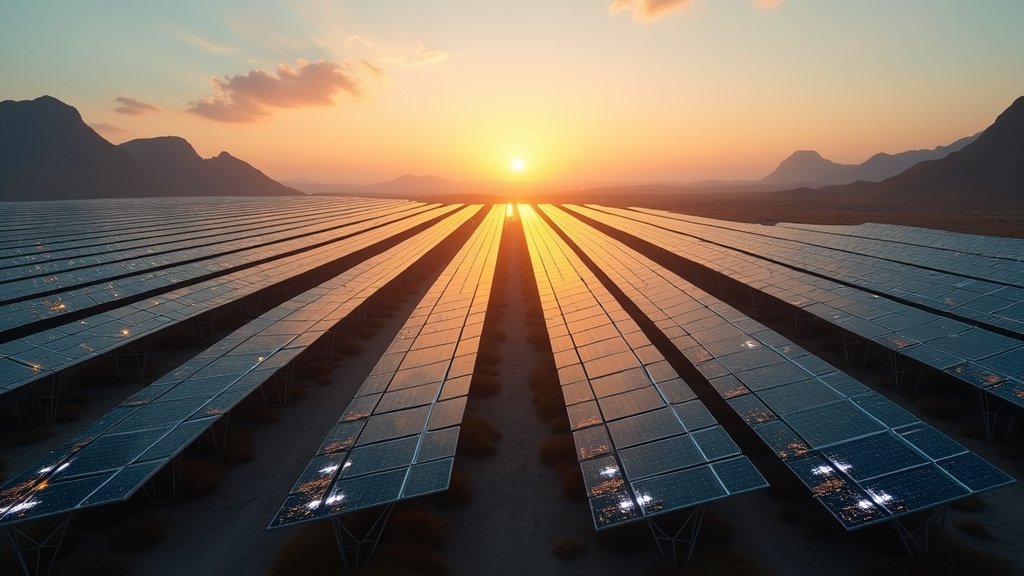JOHANNESBURG, SOUTH AFRICA – In a significant leap forward for renewable energy procurement on the continent, SOLA Group has announced the early Commercial Operations Date (COD) for its groundbreaking Springbok Solar Power Project. This 195-megawatt (MW) solar photovoltaic (PV) facility is not only Africa’s first multi-buyer, flexible energy wheeling facility but has also been delivered ahead of its scheduled completion. This development marks a pivotal moment, demonstrating innovative approaches that accelerate grid modernization and the transition to sustainable energy sources.
A Landmark Achievement for African Renewable Energy
The Springbok Solar Power Project represents a major breakthrough in how large-scale renewable energy is procured in Africa. “Virtual wheeling” is a sophisticated mechanism that allows electricity generated from an off-site renewable source, like a solar farm, to be virtually delivered to a business through the existing national or municipal grid. Unlike traditional wheeling, which necessitates a direct energy transfer line, virtual wheeling utilizes billing and energy metering systems to offset a business’s grid energy usage with renewable energy credits from a remote site. This innovation makes it possible for companies to support clean energy without the need for on-site solar installations, a crucial development for businesses, especially those connected to municipal power grids or with widespread operations. The project’s early completion cements SOLA Group’s reputation for delivering complex projects on time and within budget.
The Multi-Buyer Model: A Game-Changer
A core innovation of the Springbok facility is its pioneering flexible multi-buyer platform. Traditionally, energy wheeling plants have been enabled by a single private offtake. This new model allows multiple corporate clients to procure power from a single plant, offering flexible contract lengths. This offers both long-term contracts for maximum savings and rolling PPAs with flexible contracting, a new market offering that allows for shorter-term, scalable agreements mixed with longer-term commitments. Amazon serves as the anchor buyer for the project, with its long-term commitment being instrumental in unlocking financing and enabling the project to move forward as it pursues its goal of achieving net-zero carbon by 2040. Beyond Amazon, the 195MW facility has secured contracts with a diverse range of prominent partners, including Sibanye-Stillwater, Sasol, Afrimat, Redefine, Old Mutual, and Vodacom. This broad base of buyers underscores the growing interest and commitment from top South African industries towards sustainable energy solutions.
Driving Sustainability and Grid Modernization
The impact of the Springbok Solar Power Project extends beyond mere energy generation. At full capacity, it is set to generate approximately 430 GWh of electricity annually, enough to power an estimated 150,000 homes. Critically, it will offset around 399,000 tonnes of CO₂ annually, equivalent to planting 6.5 million trees. This substantial reduction in carbon emissions significantly contributes to South Africa’s transition away from carbon-intensive power sources. Furthermore, the project is considered a vital step in modernizing South Africa’s grid infrastructure, creating a scalable model for future developments and demonstrating how innovative approaches can accelerate grid modernization. In a significant move for regional energy security, the project has also allocated power for export to the Southern African Power Pool (SAPP) market, aiming to provide much-needed energy supply to neighboring countries currently facing energy deficits.
Economic and Community Impact
The project has already made a substantial impact on local communities. SOLA Group has invested R375 million in community programs, creating employment opportunities for 500 permanent and part-time employees, with a notable emphasis on hiring locally and ensuring 49% of workers are youth. This investment highlights how renewable energy projects can foster economic growth and provide widespread benefits for people making a huge difference in their field or area of interest. This project, alongside SOLA Group’s previous ventures, brings its total operational portfolio to 464 MWp, making it the largest operator of private power contracts in South Africa. This positions SOLA Group as a leader in making a huge difference in the country’s energy landscape.
Looking Ahead
The success of the Springbok Solar Power Project sets a precedent for future large-scale renewable energy developments across Africa. SOLA Group is already looking to build on this innovation, with further large-scale utility projects slated to break ground in November 2025. These upcoming projects are designed to incorporate significant Battery Energy Storage System (BESS) capacity, which, when blended with solar, offers a more cost-effective solution than wind power and can reliably offset expensive peak power. The facility’s success is a trending news item for its innovative approach, showcasing how virtual wheeling is becoming a pivotal tool for businesses seeking to meet ESG targets, achieve price predictability, and secure energy reliability without significant infrastructure changes. This news about SOLA Group’s pioneering initiative is making waves in the renewable energy sector, offering a clear path for other businesses interested in clean energy procurement.
SOLA Group’s Springbok Solar Power Project is more than just a power plant; it is a testament to African innovation, a catalyst for sustainable development, and a beacon for the continent’s burgeoning renewable energy future, proving that ambitious clean energy goals are achievable and can be met ahead of schedule.





